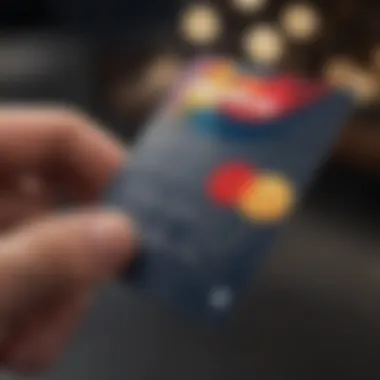Explore the Features and Benefits of Discover Credit Cards


Intro
Navigating the landscape of credit cards can be quite the task, especially when trying to make sense of the myriad choices available. For many consumers, Discover credit cards stand out prominently due to their competitive features and rewards programs. Let's face it, they aren't just another piece of plastic in your wallet; they can play a significant role in your financial puzzle. This section unfolds some foundational points that will pave the way for a deeper exploration into Discover cards, setting the stage for the specific features and benefits associated with them.
When looking at financial products, understanding the market context can shine a light on what makes Discover unique. The model of cashback rewards, for instance, is something that resonates with many, often leading consumers to deconstruct how these cards can best serve their needs.
These cards typically offer various perks that cater to both everyday spending and larger purchases. What's more, Discover has been making waves with its commitment to customer service and transparency, which can often feel like a breath of fresh air in a crowded marketplace.
Embarking on this journey, we will explore not just the specifics of applications and rewards, but also what it all means in a broader financial context. From submission of applications to understanding interest rates, each step is crucial to making an informed decision.
"Understanding your options can make all the difference between a mediocre credit card experience and one that truly benefits your financial life."
With this introduction, we set the course to dive deeper into the essential features of Discover credit cards, discovering their potential impact on users. Each subsections aims to unravel the importance and the implications these cards may have on personal finance.
Prolusion to Discover Credit Cards
Credit cards have firmly embedded themselves in the fabric of modern personal finance, acting as both a tool for convenience and a means of achieving financial flexibility. The Discover credit card sits at a noteworthy intersection of these functions, providing numerous benefits to its users. This section lays the groundwork by examining the significance of Discover credit cards and the factors influencing their adoption among consumers and investors alike.
The Role of Credit Cards in Personal Finance
When it comes to managing personal finances, credit cards serve multiple crucial roles. First and foremost, they provide a means to manage cash flow by enabling users to make purchases even when cash is limited. It's like having a safety net in your pocket; you make a purchase today and have a grace period to pay it off later. That’s a massive plus for budgeting and planning.
In addition to convenience, credit cards—especially ones like Discover—offer rewards that can significantly enhance the value of spending. For instance, if you're frequently dining out or traveling, cashback offers or travel-related perks can turn everyday purchases into rewards. Think of it this way: Spending money becomes an investment in future benefits rather than a simple expense.
Using credit cards wisely can also build a positive credit history, which is vital for securing loans, mortgages, or even renting an apartment. A good credit score opens doors, allowing individuals to access better interest rates and financial products. However, with great power comes great responsibility. Users must be cautious about accumulating debt and manage their balances carefully to avoid high interest rates that can spiral out of control.
Overview of Discover as a Financial Institution
Discover Financial Services has carved a niche for itself in the competitive landscape of credit card providers. Originally founded in 1985, it has continually evolved its identity and offerings. Known primarily for its cashback credit cards, Discover stands out from traditional rivals by promoting transparency and customer satisfaction.
One noteworthy feature is Discover's commitment to no annual fees. Customers can enjoy the benefits of credit without the burden of additional charges, making it an attractive option for those wary of cost. Moreover, its fraud protection policies are robust. Discover emphasizes security, going so far as to offer alerts for unusual charges, ensuring a more peaceful mind regarding theft or misuse of the card.
Additionally, Discover's rewards programs are crafted to meet a wide range of customer needs, from casual spenders to frequent travelers. This flexibility is not just a gimmick; it reflects the company's understanding of diverse lifestyles and spending patterns.
In summary, the combination of practical features and user-centered policies makes Discover not just another card in the wallet, but a significant player in broader financial planning. As we move through the article, readers will find ample information to determine how Discover credit cards could fit into their financial lives.
Types of Discover Credit Cards
When you consider the quality of your financial toolkit, having the right credit card is key. Discover credit cards cater to various needs, making them an appealing option. Many folks are unaware that their specific spending habits can tilt the balance towards one type of Discover card over another. It’s not merely about getting a card—it's about finding the right one that aligns with your financial goals.
From daily shoppers to avid travelers or students just starting their financial journey, Discover has a solution tailored just for you. Let’s unpack the different types of cards offered by Discover and what makes each one tick.
Cash Back Credit Cards
Discover's Cash Back Credit Cards are like icing on the cake if you enjoy earnig something back on what you spend. These cards typically offer varying percentages of cash back depending on the category of your purchase. For instance, you might score 5% back on groceries in one quarter and then 1% back on everything else the rest of the time.
Key Points:
- Flexible rewards: You have the ability to earn cash back in categories that change quarterly. This means you can maximize your benefits based on your spending habits.
- Introductory offers: Many cash back cards come with enticing sign-up bonuses that can give you a refreshing head start.
These cards really shine if you can keep track of category changes and align them with your shopping patterns. However, if you don’t want to keep tabs or make adjustments regularly, you might miss out on the full benefits.
Travel Credit Cards
If traveling is your bread and butter, consider Discover's Travel Credit Cards. These cards are designed for those who frequently hit the skies. They often come loaded with benefits that can make any wanderer raise an eyebrow.
Important Features:
- Earning travel rewards: Users typically earn points for each dollar spent, which can later be redeemed for airfare, hotel stays, or even rental cars.
- No foreign transaction fees: This can be a huge win if you love exploring abroad. Avoiding such fees can save you a decent amount while you’re globetrotting.
However, tread lightly—sometimes the rewards systems can be complicated, so it’s essential to fully understand how to best utilize your points.
Student Credit Cards
Discover also shines with their Student Credit Cards, specifically designed for young adults. For students who are just getting a taste of the credit world, having the right type of card can pave the way for future financial health.
Key Benefits:


- Low credit limit: These cards generally come with a lower limit, helping young users to manage their spending effectively without spiraling into debt.
- Rewards for good grades: Some cards even offer rewards like cash back or bonuses for maintaining a certain GPA—an added incentive to thrive academically.
When handled right, student cards can be a stepping stone to building a solid credit history before entering the bigger financial game.
Secured Credit Cards
For those looking to rebuild or establish a credit history, secured credit cards from Discover can be a wise choice. With a secured card, there's an initial cash deposit that serves as your credit limit, so it’s a safe route to take.
Noteworthy Considerations:
- Building credit: Using a secured card responsibly can help enhance your credit score over time, provided all bills are paid on time.
- Potential upgrade options: After showing responsible spending for a period, you may qualify to upgrade to an unsecured card, which is a major win in the credit game.
Wrapping this up, understanding the different types of Discover credit cards is pivotal to making an informed decision. From nurturing the novice to rewarding the seasoned spender, each card offers unique perks tailored to align with individual financial aspirations. Finding that fit can set you up for a successful financial future.
Application Process for Discover Credit Cards
The application process for Discover credit cards is a pivotal step for anyone looking to enhance their financial toolkit. This process not only determines the suitability of the credit card for the applicant’s lifestyle but also sets the stage for responsible credit management. Understanding how to navigate through this has a significant impact on your overall financial health.
Eligibility Requirements
Before diving into the application, it’s crucial to grasp the eligibility requirements. These criteria are designed to ensure potential cardholders have a fitting financial background to responsibly handle credit. Generally, applicants should:
- Be at least 18 years old.
- Have a valid Social Security number or an Individual Taxpayer Identification Number (ITIN).
- Present a steady source of income to prove ability to repay credit.
- Maintain a reasonable credit history, which can often vary depending on the specific card being sought.
Keep in mind that your credit score is particularly influential. Discover uses this as a yardstick to gauge risk when approving applications. Prospective cardholders with higher scores usually enjoy better chances of approval, thus it’s wise to check your score beforehand.
Step-by-Step Application Guide
Now, let’s gear up for the actual application. This process can feel a bit overwhelming, but breaking it down into manageable steps can ease the burden. Here’s a simple step-by-step guide:
- Research Available Cards: Visit Discover’s website to learn about different credit cards they offer, catering to various needs, such as cash back, travel rewards, or student cards.
- Select the Right Card: Based on your spending habits and needs, choose the card that offers the most suitable benefits for you. Each card will have unique features - so this decision beans plenty of thought.
- Gather Necessary Information: Before you start the application, collect all needed documents like your identification, income statements, and housing info. It’s better to have everything at your fingertips.
- Fill Out the Application: Navigate to the application form on the Discover website. The form typically requires personal information, financial details, and sometimes questions about your spending habits.
- Review Your Application: Take a moment to cross-check all the entered information for any mistakes or typos. This could make a difference in the approval process.
- Submit Your Application: After ensuring everything is correct, submit your application. Expect a response, either immediate or within a few days, depending on Discover’s processing.
- Set Up Online Account: If approved, it’s beneficial to set up an online account to manage your card activities easily.
Common Application Pitfalls
Even seasoned applicants can trip over some common pitfalls when applying for a Discover card. Being aware of these can save you time and frustration:
- Incomplete Applications: Leaving out crucial information may lead to rejection.
- Misunderstanding Terms: Always read the fine print. Some promotional offers might have conditions that can alter your rewards.
- Not Checking Your Credit Report: Before applying, check your credit report for errors that could harm your chances.
- Excessive Applications: Applying for too many cards in a short amount of time can negatively impact your credit score, making it harder to get approved.
"Understanding the ins and outs of the application process can ease anxiety and bring confidence to potential applicants."
Understanding Discover Rewards Programs
Understanding Discover rewards programs is a pivotal element of choosing their credit cards, as it highlights how users can leverage their spending into tangible benefits. Unlike some providers that scatter rewards options across various tiers and conditions, Discover simplifies this concept, making it more accessible for the average consumer. It’s essential to grasp how these rewards programs can significantly enhance the value derived from everyday purchases, which, in the long run, can contribute to more financial flexibility and savings.
Overview of Reward Structures
Discover offers its cardholders a unique approach to rewards through distinct program structures tailored for different spending habits. The most common formats include cash back rewards and points. With cash back, cardholders earn a percentage of their spending back, often at varying rates for different categories. For instance, a typical cash back scheme might offer 1% back on all purchases, but can go as high as 5% for specific categories like grocery stores or gas stations during designated periods.
On the other hand, Discover's point system rewards users for every dollar spent and often ties into travel or gift card redemptions, making it appealing for users who prefer flexibility over straightforward cash back. Understanding these reward structures helps consumers make informed decisions on which card suits their lifestyle the best.
Maximizing Cash Back Offers
To really get the most bang for your buck, it’s critical to tap into Discover's robust cash back offers. Timing plays a crucial role here. Users should keep an eye out for promotional periods when cash back rates may spike in categories like online shopping or dining out.
Consider the following strategies for maximizing cash back:
- Pay attention to quarterly categories: Discover frequently rotates categories that earn higher cash back. Make a note of these and plan your spending accordingly.
- Use the app to track rewards: Discover's app provides real-time updates on your rewards, which can prompt you to adjust your spending habits.
- Budget wisely: Plan your monthly budget to cover expenses where cash back is maximized.
These small tweaks can lead to accumulative savings and significantly enhance the overall benefits of using a Discover card.
How to Redeem Points and Rewards
After diligently earning rewards, understanding how to redeem them is just as crucial. Discover lays out a user-friendly redemption process that allows cardholders to exchange their points for various rewards ranging from cash deposits to travel experiences.
To redeem your points effectively, consider these steps:
- Log into your account: Access your rewards through the Discover website or app.
- Explore your redemption options: Choose to redeem for cashback, travel, gift cards, or other experiences. Notably, cashback is often more straightforward and appealing to numerous cardholders.
- Keep an eye on promotions: Discover sometimes offers higher value for points during special promotions, especially for travel bookings.
Remember, if you play your cards right, understanding and navigating these redemption processes can boost your benefits further, ensuring your expenses are translating into valuable gains.


"Tapping into Discover's programs can be the difference between an average cardholder experience and a truly rewarding financial journey."
By understanding these critical aspects of Discover's rewards programs, individuals can better evaluate how Discover credit cards can enhance their personal financial strategies.
Pricing and Fees Associated with Discover Credit Cards
Understanding the pricing and fees associated with Discover credit cards is essential for anyone considering these financial tools. It not only helps in evaluating the overall cost but also in understanding how they fit into your financial strategy. While these cards can offer great benefits, like cash back or travel rewards, it’s vital to read the fine print regarding costs. This section breaks down the specifics such as annual fees, interest rates, foreign transaction fees, and penalty fees, allowing you to make an informed decision.
Annual Fees and Interest Rates
When it comes to annual fees, Discover offers a range of cards—many with no annual fee, which can be a compelling reason to consider them. For example, certain cash back and student credit cards do not carry annual fees, allowing users to reap the benefits without facing an immediate financial cost. However, for premium cards with enhanced rewards or travel benefits, an annual fee may apply. It's crucial to assess whether the benefits of such programs outweigh the associated costs.
Interest rates on Discover cards can vary widely based on creditworthiness and market conditions, generally falling within a competitive range. Some customers might find promotional rates during the first few months an attractive option, but it's important to understand when the regular rate kicks in. It may also be wise to consider how the interest rate affects your finances if you plan on carrying a balance. Staying on top of payments is essential to avoid interest piling up.
Foreign Transaction Fees
For those who enjoy traveling outside the country, foreign transaction fees are a significant consideration. Many credit cards charge around three percent on each purchase made in a foreign currency. However, Discover stands out by not imposing such fees on many of its cards. This can make their credit cards an attractive option for frequent travelers. Without these fees, you may save money during your journeys abroad.
“Using a credit card with no foreign transaction fees can add up to significant savings when exploring international destinations.”
Penalty Fees and Their Implications
Lastly, penalty fees are another crucial aspect of credit card usage that cannot be overlooked. Late payments or exceeding your credit limit can lead to hefty penalties, which can kick in immediately on your next billing cycle. Discover generally has clear policies on late fees, but it’s useful to pay your bills on time to avoid these unnecessary costs. Not only does a late payment incur costs, but it can also adversely affect your credit score.
Here are a few things to keep in mind regarding penalty fees:
- Late Payment Fees: Can range from $0 to $40 depending on how late the payment is and whether it is a recurring issue.
- Over-Limit Fees: While many issuers no longer charge over-limit fees, it's crucial to monitor your available credit to avoid situations where this could occur.
- Impact on Credit Score: Being delinquent on payments can hurt your credit score, potentially resulting in higher interest rates in future credit engagements.
Understanding these financial components related to Discover credit cards will enable consumers to make informed decisions, optimizing their rewards and minimizing unexpected costs.
Security Measures for Discover Credit Cards
Understanding the security measures surrounding Discover credit cards is vital in today’s digital age where fraud is rampant. With more transactions happening online, safeguarding one’s personal and financial details has grown increasingly important. Discover, like other financial institutions, implements robust security initiatives to provide peace of mind to its customers. This section elaborates on various security features designed to keep your information safe, as well as practical tips for monitoring and reporting issues.
Fraud Protection Features
Discover takes fraud protection seriously; they’ve got various features to help shield customers from deceitful activities. One notable program is their $0 Fraud Liability Guarantee. Essentially, if you report unauthorized transactions promptly, you won’t be responsible for any fraudulent purchases. This protection isn’t just a marketing ploy; it reflects their commitment to customer safety.
- Real-time alerts: Discover also employs real-time transaction alerts. Whenever a purchase is made using your card, you’ll receive a notification, letting you know it’s all above board. If you spot something suspicious, you can act fast.
- Credit score tracking: Monitoring your credit score and report is another preventative measure. Discover offers tools that help you keep tabs on your credit health, which can be a good indicator of potential fraud.
In the fast-paced world we live in, not realizing you’ve been a victim of fraud until it’s too late can be a grave oversight. Therefore, staying proactive is essential.
Monitoring Your Account
Keeping a vigilant eye on your account is crucial in spotting discrepancies early. Discover provides an intuitive online platform and mobile app that allows you to monitor activity easily.
It’s usually a good idea to check your statements regularly. Try to check at least once a week. Here are a few specific things to focus on:
- Analyze your transactions: Look for unfamiliar purchases. Sometimes, a minor charge might go unnoticed until it adds up.
- Set up automated alerts: Within your account settings, you can customize notifications based on your spending habits. For example, if you frequently spend below a certain threshold, receiving an alert for large charges can prevent surprises.
Engaging in these practices not only helps you keep track of your finances but also establishes a pattern of behavior that reflects your spending habits. When this pattern is disrupted, it becomes easier to detect potential fraud.
Reporting Lost or Stolen Cards
Accidents happen, and losing your card or having it stolen can be quite distressing. But Discover has made the reporting process straightforward and user-friendly. First and foremost, immediately report the loss through the Discover mobile app or customer service line. The sooner you act, the less liability you have.
To streamline the reporting process:
- Have your account details ready: When contacting customer service, ensure you have your account number or relevant identification on hand. It makes the process quicker.
- Monitor your account for unauthorized charges: After reporting, dive into your account to keep an eye on any further suspicious activity.
In a distressing situation like this, clear and prompt communication can save time and money. Discover works diligently to resolve these matters quickly, allowing you to get back on track with your finances.
By being proactive, you can protect your financial health and well-being. Always remember—if something looks off, it probably is.
User Experiences with Discover Credit Cards
User experiences play a crucial role in shaping the understanding of Discover credit cards. They provide insight not only into how these cards function in real-world scenarios but also into how they meet the needs of various users. By examining consumer feedback and success stories, we grasp the multifaceted impact of these cards on personal finances and purchasing power. In a competitive credit card market, experiences shared by users reflect the nuanced choices potential applicants must evaluate, helping to clarify the benefits and drawbacks associated with Discover credit cards.


Consumer Ratings and Feedback
Consumer ratings and feedback related to Discover credit cards are plenty across various platforms. Many users praise the cash back options and the straightforward structure of points accumulation. For instance, someone might note that "I love how I get 5% back on rotating categories that really align with my spending habits!"
On platforms like Reddit, users often share their enthusiasm about the ease of redeeming rewards and the customer service experience. Feedback often highlights key factors such as:
- Customer Service: Many users express satisfaction with helpful representatives who are available to assist with inquiries and disputes.
- Clear Terms: Reviewers appreciate having no hidden fees or complex jargon in the terms and conditions, making it easier to understand what they’re signing up for.
However, it’s important to note that ratings can vary significantly. A handful of users may point out issues with the application process. Feedback like, "I had challenges validating my identity during the application, which was frustrating," illustrates a common concern. While overall ratings are generally positive, variations provide a nuanced view of user satisfaction.
Success Stories
Success stories related to Discover credit cards often highlight how using these cards facilitated positive financial outcomes. Many individuals share their experiences regarding how the rewards helped them achieve travel goals or big purchases. For example, one user might recount:
"Thanks to my Discover card, I was able to gather enough points to book a weeklong vacation with my family! The rewards added up quickly, and it felt great to use cash back for something special."
Such narratives resonate with potential cardholders who are looking for tangible benefits. These testimonials underscore the practical applications of the rewards programs and how they can enhance the overall consumer experience. Moreover, they illuminate how customers strategically engage with the card's features—like using it for regular expenses to maximize earnings.
Common Complaints
Despite the merits, common complaints are part of the narrative surrounding Discover credit cards. Some users air their grievances, often focusing on:
- Limited Acceptance: A frequent issue mentioned is that some merchants do not accept Discover cards. This point can discourage potential users who want a card that is widely accepted. The comment, "It’s such a hassle when my favorite store doesn’t take Discover!" encapsulates this sentiment well.
- Reward Change: Another concern is about changes in the rewards structure. Some cardholders find it frustrating when the percentage of cash back for specific categories changes each quarter, leading to uncertainty in planning purchases.
- Credit Limit Disappointment: Users have noted feeling underwhelmed by their initial credit limits. Comments like, "I was hoping for more, given my credit score," reflect the disconnect some feel between their credit profiles and the limits set by Discover.
Overall, while Discover credit cards have a solid reputation forged by positive consumer experiences, potential cardholders should be informed about the challenges and complaints expressed by existing users. This dual perspective equips potential applicants with a rounded view, fostering informed decisions in their credit journey.
The Role of Discover in Credit Card Innovation
Understanding the role that Discover plays in credit card innovation is like peering through a window into the evolving landscape of personal finance. As a major player in the credit card market, Discover has been at the forefront of introducing features and technologies that reshaped consumer experiences. This section explores several specific elements that underscore the significance of Discover's innovative spirit and how it benefits both consumers and the broader financial ecosystem.
Technological Advancements
At the core of Discover's contribution to credit card innovation are several noteworthy technological advancements. Perhaps one of their standout features is the implementation of contactless payment technology. This capability makes transactions smoother and quicker, catering to the fast-paced lives of consumers who prefer efficiency. With just a tap of the card, users can complete their purchases, which is especially beneficial in busy retail environments.
Moreover, Discover has embraced mobile wallet technologies, enabling customers to store their cards in digital platforms. This shift not only heightens convenience but also enhances security through tokenization. Essentially, a token replaces sensitive card details during transactions, reducing the risks of fraud.
Discover also rolled out enhanced fraud detection systems that utilize advanced algorithms and machine learning. This allows the company to analyze spending patterns almost in real-time, identifying unusual transactions that could signal fraud. As a user, knowing that there's a robust system actively watching over your account instills a sense of safety that is hard to overstate.
"Innovation isn't just about doing things differently; it's about delivering real value to the customer. Discover's approach to technology exemplifies this mindset."
Response to Market Trends
As consumer needs evolve, so does Discover's strategy to remain relevant and appealing. They’ve been quick to respond to shifting market trends, particularly in the realm of rewards and customer service. With consumers yearning for more personalized experiences, Discover's adaptations are telling of a broader trend in financial services.
One prime example is the evolution of cashback rewards. Recognizing that users are gravitating towards tangible benefits, Discover has enhanced its cashback offers to stand out in a saturated marketplace. The Discover It Cashback card, for instance, provides elevated cashback rates on rotating categories, engaging users while offering them the chance to earn points where they spend the most.
In addition, flexibility in credit limits and ease of accessing customer service through various channels—such as chat, phone or even social platforms—shows how Discover keeps its ear to the ground. The importance of responsive customer service can’t be overstated, especially in a digital age where users expect swift answers. Customers frequently mention the ease of contacting Discover, which is a reflection of the company's commitment to retaining customer loyalty.
Ending
Final Thoughts on Discover Credit Cards
When delving into the realm of Discover credit cards, it’s essential to step back and consider the overarching implications of these financial tools in your personal finance strategy. This article has examined various facets of Discover credit cards, from their diverse offerings to the specific nuances within their rewards programs. As we draw toward a conclusion, it becomes clear that understanding Discover credit cards is not merely about knowing how they function, but rather recognizing how they can align with your unique financial goals.
Weighing the Pros and Cons
In the world of finance, every decision carries weight. Each choice comes with its fair share of advantages and disadvantages, and Discover credit cards are no exception.
Pros:
- Robust Reward Programs: Discover offers rewards that can significantly benefit those who frequently utilize their cards. Cashback offers and travel perks often entice users to spend more wisely and derive actual value from their purchases.
- No Annual Fees on Most Cards: Unlike many competitors, Discover often provides options without annual fees, making it an attractive choice for budget-conscious individuals.
- Innovative Security Features: Protecting your financial information is paramount. Discover’s commitment to fraud protection and their real-time monitoring can offer peace of mind to cardholders.
Cons:
- Limited Acceptance: While Discover has made strides in customer acceptance, it still trails behind Visa or Mastercard. This limitation might frustrate users in certain areas or establishments.
- Potentially Higher Interest Rates: Depending on your creditworthiness, Discover's interest rates might be higher than preferred, especially if one carries a balance.
- Complex Rewards Structure: At first glance, the rewards program may appear beneficial, but the structures can be complex and may lead to confusion in redemption strategies.
Important takeaway: Weighing these pros and cons helps consumers tailor their financial choices. What’s beneficial for one might not fit another’s needs.
Future of Credit Cards and Discover's Role
It’s crucial to look beyond the current landscape and ponder what the future may hold for credit cards. Many trends indicate that credit cards will continue to evolve, adapting to the shifting demands of consumers and technological advancements.
Discover, a seasoned entity in this industry, appears well-positioned to navigate these changes. As digital currencies and mobile wallets gain traction, Discover has already started integrating service options that align with these trends. The company’s commitment to innovation—evident through its technological adaptations—will likely keep it competitive.
Furthermore, personal finance education continues to gain importance. Consumers are increasingly seeking products that not only serve functional purposes but also enhance their financial literacy. Discover’s efforts in this space can substantially benefit the consumer base.



